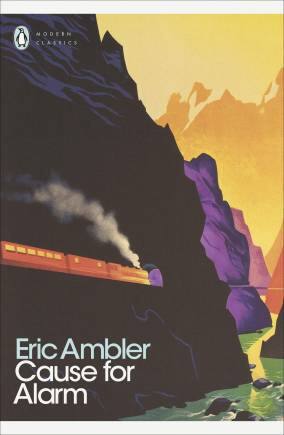Eric Ambler's heroes aren't professional spies; they are ordinary men - sometimes cynical, sometimes courageous. (Representational image: Tetiana Shyshkina via Unsplash)
Authoritarians are in power, a global recession lurks around the corner, and the dogs of war snarl daily. Aspects of today’s world are in tune with the 1930s, bearing out the assertion that history doesn’t repeat itself, but it often rhymes.
The paranoid, furtive flavour of that era was grippingly captured by Eric Ambler in his early espionage thrillers. Given the recent election victory of  Giorgia Meloni’s right-wing alliance a century after Mussolini was sworn in as Prime Minister, it seems apt to revisit Cause for Alarm, which was published in 1938 and set in Fascist Italy.
Giorgia Meloni’s right-wing alliance a century after Mussolini was sworn in as Prime Minister, it seems apt to revisit Cause for Alarm, which was published in 1938 and set in Fascist Italy.
When writing about Ambler, it’s almost obligatory to quote John le Carré, who said that he was “the source on which we all draw”, and Graham Greene, who called him “unquestionably our best thriller writer”. They aren’t the only ones. In a rave review of his last novel, The Care of Time, P.D. James wrote that Ambler had created the modern spy thriller set in “a normally ambiguous and, above all, political world”. Sounds familiar.
In such a world, Ambler’s heroes aren’t professional spies or cloak-and-dagger specialists. They are ordinary men, sometimes cynical, sometimes courageous and sometimes cowardly, caught up in events beyond their control. The central character of A Coffin for Dimitrios is a mystery writer; in Uncommon Danger, a freelance journalist; and in The Light of Day, a taxi driver and petty thief.
Similarly, in Cause for Alarm, British engineer Nicholas Marlow finds himself enmeshed in realpolitik’s grinding gears. At the start, Marlow is told that he is out of a job because his engineering firm has to reduce operations. Unfortunately, this announcement comes a day after he has successfully proposed marriage to the woman in his life.
“Trade recession, they called it in the newspapers,” Marlow thinks bitterly. “As far as I could see there wasn’t a great deal of difference between a trade recession and a good old-fashioned slump.” It was “the unskilled, the clerks and storekeepers with wives and families, who would suffer”. As always.
A desperate Marlow agrees to become the Italian representative of the Spartacus Machine Tool Company as a stop-gap until something more suitable turns up. The company’s primary task is to produce ammunition shells, and they urgently need a replacement for an employee killed in a car accident.
In Milan, Marlow soon starts to wonder what he has got himself into. The behaviour of an Italian co-worker is suspicious; the circumstances of the former employee’s death are mysterious; and his passport is promptly impounded by the local police station “for official purposes”.
This is the time of a Rome-Berlin axis, with Mussolini delivering populist speeches from the balcony of the Palazzo di Venezia and armaments companies making huge profits. Among those whom Marlow meets is an enthusiastic adherent of fascismo who tells him that Italy will “wade through blood to an Empire”. Marlow wryly thinks: “He didn’t tell me whose blood, but I gather that he does not expect to be called upon to supply any part of it.”
On this European chessboard, reliable information about arms production is invaluable. Marlow is approached by a shady character who introduces himself as a Yugoslav captain, as well as a striking brother-sister duo who claim to be from America and “on the side of the angels”. (Readers of Ambler’s earlier Uncommon Danger will know of this pair’s antecedents.)
Incidents multiply, as they tend to do. Marlow becomes a wanted man, implicated in a web of commissions and compromised national interests. He now has to stay a step ahead of Soviet and Balkan agents, dodge pursuers at fascist rallies, and evade the police to get over the border.
As a justification for action, Marlow is told at one point that demand is sacred. “It may be a demand for high explosives to slaughter civilians with or one for chemical fertilisers, it may be for shells or it may be for saucepans, it may be for jute machinery for an Indian sweatshop or it may be for prams, it’s all one. There’s no difference.” The businessman, then, “has no other responsibility but to make profits for himself and his shareholders”. Words to gladden a neo-liberal heart.
The protagonist of Uncommon Danger takes this line of thought further. “The Foreign Ministers of the great powers might make the actual declarations of their Government’s policies,” he feels, “but it was the Big Business men, the bankers and their dependents, the arms manufacturers, the oil companies, the big industrialists, who determined what those policies should be.”
In such passages, Ambler’s sympathies with leftist causes are apparent, even if they are not forced onto the narrative. This was before Stalin’s brutal policies were common knowledge, and in reaction to which Ambler later wrote Judgment on Deltchev, a novel that was met with hostility from fellow travellers.
Ambler also had a keen eye for how narratives are shaped by the powerful. In A Coffin for Dimitrios, a character notes that “propaganda always begins with words, but soon it proceeds to deeds”. When there are no facts to support lies, “facts must be made”.
Entertaining and atmospheric, Cause for Alarm is a small window into the shenanigans of European nation-states in the build-up to World War II. Alan Furst once wrote that Ambler’s instinct for “plot dynamics and character production is close to perfect”. The same instinct led him to write about issues that are still worryingly relevant.